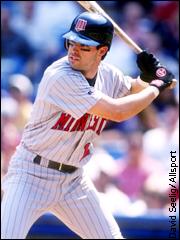 |
|
| | Wednesday, April 19 Minnesota Twins | ||||||||||
| By John Sickels Special to ESPN.com
Record: 63-97, 30th overall Payroll: 15.8 million, 28th overall Runs scored: 686, 14th in AL Runs allowed: 845, 5th in AL What went right? The pitching was surprisingly good. Brad Radke remained his steady self. Eric Milton took a big step forward to become one of the best young pitchers in the league. Joe Mays was a surprise. Scrap-heap acquisition Bob Wells did good work in relief. Rookies Jacque Jones and Corey Koskie showed they could hit major league pitching. Chad Allen played better in the majors than he ever did in the minors. The team played .500 ball for part of the summer, before totally collapsing in September. What went wrong? The hitting was awful. The offense scored the fewest runs in the league, inexcusable in the Metrodome. Todd Walker hit .279 instead of .316, and his power dropped off. Matt Lawton didn't hit after getting beaned. David Ortiz struggled in spring training, then spent the year in the minors working on his defense. His replacement, Doug Mientkiewicz, hit .227 with no power. Rookie Cristian Guzman has a flashy glove at shortstop, but hit .226. LaTroy Hawkins remained an enigma in the rotation. In retrospect, the critical decisions were: 1. Tom Kelly's decision to move Mays to the rotation. Kelly is underrated as a handler of pitchers, and this worked out better than anyone expected. Mays posted a 3.72 ERA as a starter. 2. Sending Ortiz to the minors to work on his defense. His glove is legitimately bad, but the Twins could have used his power in the DH slot. 3. Giving Brent Gates 340 plate appearances at the expense of Todd Walker and Corey Koskie. Kelly's deep concern with defense kept Gates' weak bat in the lineup far too often. Looking ahead to 2000 Three key questions 1. Can the underachieving Twins offense rebound? Much depends on Walker and Lawton. 2. Who will win the catching job following the retirement of Terry Steinbach? 3. Who will close with the departure of Mike Trombley to Baltimore? Can expect to play better Lawton and Walker are too talented not to hit more than they did last year. Hector Carrasco will do better a year removed from surgery. Mientkiewicz isn't as bad as he looked. Ortiz is a natural-born DH, and could thrive if allowed to concentrate on hitting. Guzman should gradually improve his bat. Can expect to play worse Joe Mays has a mixed track record; he could easily backslide. Chad Allen is due for a slump, if his minor league numbers are any indication. Few of the Twins exceeded expectations last year, so it's hard to pinpoint someone who is a good bet to do worse in 2000.
Projected lineup CF Jacque Jones/Torii Hunter 2B Todd Walker RF Matt Lawton 3B Corey Koskie DH David Ortiz LF Chad Allen 1B Doug Mientkiewicz/Mario Valdez C Javier Valentin/Chad Moeller/Matt LeCroy SS Cristian Guzman Rotation/Closer Brad Radke Eric Milton Joe Mays LaTroy Hawkins Jason Ryan/Mark Redman J.C.Romero/Bob Wells/Hector Carrasco A closer look When Eric Milton threw his no-hitter against the Angels on September 11, most media outlets pointed out that the Anaheim lineup was filled with rookies and bench players. This was true, of course, but the unspoken supposition was that the game was a fluke, that Milton isn't really that good of a pitcher. He plays for the Twins, after all. While it is true that the inexperience of the Angels lineup helped Milton in that game, the idea that he is not a solid major league pitcher is easy to dispel. His 7-11 record obscures the fact that Eric Milton is on the verge of a major breakthrough. Consider these numbers, courtesy of STATS, Inc, and their 2000 Major League Handbook.
Eric Milton W-L ERA IP H K BB
Pre All-Star Break 3-8 5.17 102.2 104 65 38
Post All-Star Break 4-3 3.82 103.2 86 98 25
In the first half, Milton looked very much like the pitcher he was in his 1998 rookie campaign: talented, promising, but not quite ready for the big time. In the second half, Milton seemed to realize that he belonged in the major leagues. He started throwing his slider and curveball with greater confidence, which made his fastball more effective.
This shows clearly in the numbers. The better ERA is nice, of course, but look deeper at the ratios. Note the drop in hits-per-inning, and the dramatic increase in his strikeouts, at the same time his walks dropped. The decline in ERA was no statistical fluke; his pitching was genuinely better.
The main job of a pitcher is to keep runners off base, and Milton excelled at that last year. Can you guess which American League pitcher had the lowest opposition on-base percentage last year? Pedro Martinez is the obvious answer, and the correct one.
Can you guess who number two was? Mike Mussina? Bartolo Colon? David Cone? Nope, it was Milton. Martinez and Milton were the only two American League pitchers with opposition on-base percentages lower than .300 last year, Pedro at .248 and Eric at .299.
Lots of things can get in Milton's way. He could get injured, and indeed, he has had some minor elbow and shoulder aches. He could lose his confidence, or his command. But the leading indicators for success in the near future are positive.
Twins fans like to compare Milton to Frank Viola, who overcame a rough rookie season to become an outstanding major league pitcher. If Milton's second half performance is any indication, the comparison is valid.
John Sickels is the author of the 2000 STATS Minor League Scouting Notebook. You can email your questions to him at JASickels@AOL.com.
| ALSO SEE Twins minor-league report ESPN.com's Hot Stove Heaters  | ||||||||||

